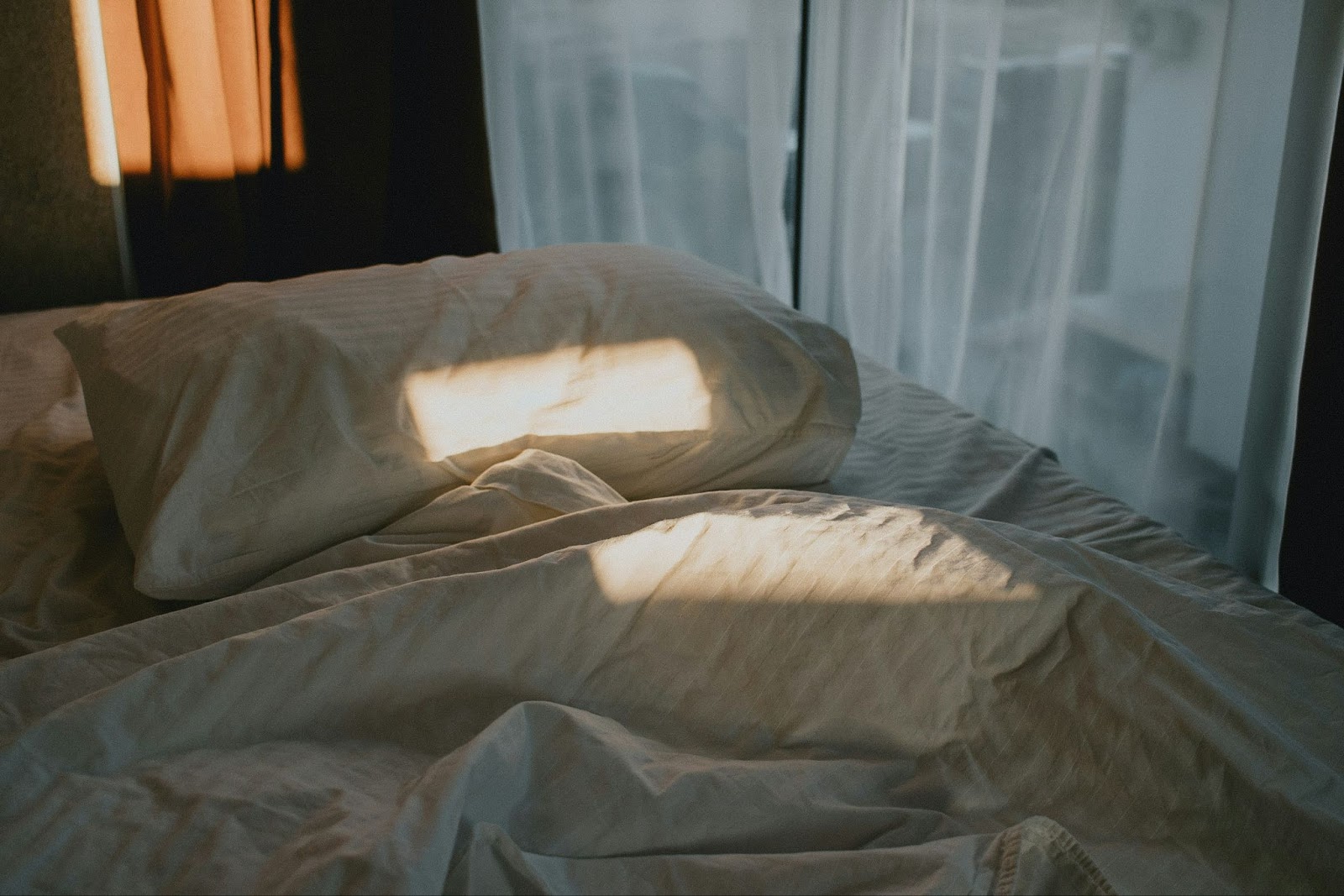Being on vacation should mean unplugging, disconnecting, and truly resting. Taking care of your mental health should be a priority. Yet, we often feel the urge to optimize every day and catch up on everything we don’t usually have time for. Letting go of the routine can be tough.
Here are 4 simple and effective tips to help you return to work feeling refreshed in both body and mind.
1. Wake up without an alarm: Let your body decide
Setting an alarm can sometimes disrupt your sleep cycle and interfere with recovery1.
Natural cycle: A study published in the Journal of Sleep Research in 2020 showed that allowing your body to wake up naturally increases the chances of waking up in a better mood, more relaxed, and well-rested by 20%2.
During the night, we typically go through four to six complete sleep cycles3. When you rely on an alarm, it may go off during deep sleep, which interrupts your recovery and prevents you from starting the day fully refreshed.
Stable energy: Waking up naturally helps you maintain steady energy levels throughout the day and avoid the dreaded afternoon crash. In fact, “over 40% of adults report experiencing an energy crash between 2 p.m. and 3 p.m., leading them to consume coffee, tea, or energy drinks.”4 A good start to your day shapes your energy, mood, and productivity.
✨ Pro tip: Leave your curtains slightly open so natural light can gently wake you up.

2. Unplug from your phone
Who hasn’t replied to a work email in the evening or even on the weekend? Notifications, messages, calls… it never ends! Truly disconnecting on vacation can be hard, but it’s essential to protect your mental health, prevent burnout, and restore a real balance between work and personal life
Screen time: If only we could just lock our phones in a little box and open it a week later! Sadly, that’s not always realistic. A more practical approach is to set screen time limits and stick to them. Most phones now offer built-in tools to restrict access to certain apps. These features are super helpful when you find it hard to unplug on your own5.
Enjoy your hobbies: Put your phone aside and take time to cook, knit, read, go for a run… all the things you usually don’t have time for!
Better sleep: Reducing blue light exposure an hour before bed can increase melatonin production by up to 50%6. For example, read on a device like a Kobo or Kindle, or go old school with a paper book instead of using your phone.
✨ Pro tip: Leave your phone outside the bedroom for the week or switch it to Do Not Disturb mode if you use it to read. Not being interrupted by constant notifications helps you truly unwind.
3. Get moving
Exercise helps release endorphins, often called the “happy hormones,” which are naturally produced by the body and help reduce stress and anxiety. What better way to clear your mind of everyday worries?
Go for a walk: Walking helps you let go, boosts creativity, and gives you a healthy dose of vitamin D. Plus, walking 10,000 steps a day can reduce your risk of mortality by over one-third and lower your risk of cardiovascular disease by at least 20%7. Apps like Health, which comes pre-installed on your iPhone, or Pedometer++8 make it easy to track your daily step count.
Moments with loved ones: Exercising with friends or family is a great way to share quality time while also taking care of your physical health and mental well-being.
Live in the moment: Moving your body helps you focus on your breath and physical sensations, which has a calming effect and brings you into the present moment.
✨Pro tip: Take the opportunity to try something new; you might just discover a new hobby you love!

4. Take time to do NOTHING… For real
It’s rare that we truly take the time to… do nothing!
Take a nap, sit outside and watch nature, or simply let yourself daydream. Picture yourself camping, sitting by a fire, on the beach, or in the forest listening to birds sing… Sounds like a dream, right?
Real rest: Doing nothing allows the brain to switch off and recharge.
Create mental space: Clearing your mind helps make room for new ideas and lets repressed emotions rise to the surface. For some, simply watching a campfire burn creates a moment of total emptiness, allowing you to do nothing but be present.
Reduce mental load: Studies have shown that taking breaks of “non-activity” can reduce cortisol levels, the stress hormone9.
Taking the time to truly unplug during vacation isn’t a luxury; it’s a necessity. Resting, moving your body, unplugging from screens, and even doing nothing all help reduce mental overload, prevent burnout, and allow you to return to work more relaxed and productive. The World Health Organization has stated that work-related stress accounts for nearly 50% of lost workdays.10 A clear reminder of how essential it is to slow down and recharge.
1. https://www.sleepfoundation.org/how-sleep-works
2. https://onlinelibrary.wiley.com/journal/13652869/journal-metrics
3. https://www.sleepfoundation.org/how-sleep-works
4. https://www.thensf.org/wp-content/uploads/2025/03/NSF_SIA_2025-Report_final.pdf
5. https://support.apple.com/fr-ca/guide/iphone/iphb0c7313c9/ios
6. https://www.health.harvard.edu/staying-healthy/blue-light-has-a-dark-side
7. https://www.sciencepresse.qc.ca/actualite/detecteur-rumeurs/2017/09/20/marcher-10-000-jour-pour-tenir-forme-vrai?gad_source=1&gad_campaignid=14075508883&gbraid=0AAAAACKr_ol0Mk7poKL3Qru7-v5oMs3sL&gclid=Cj0KCQjwmK_CBhCEARIsAMKwcD4ymcJG7cc1QCKoMDFbNDjPNQYTC6W7nHgQc3hAlQdCNFGJxP8YEZIaAqjKEALw_wcB
8. https://pedometer.app/
9. https://www.technologia.com/blogue/articles/la-charge-mentale-un-poids-invisible-a-gerer
10. https://www.who.int/publications/i/item/9241590475